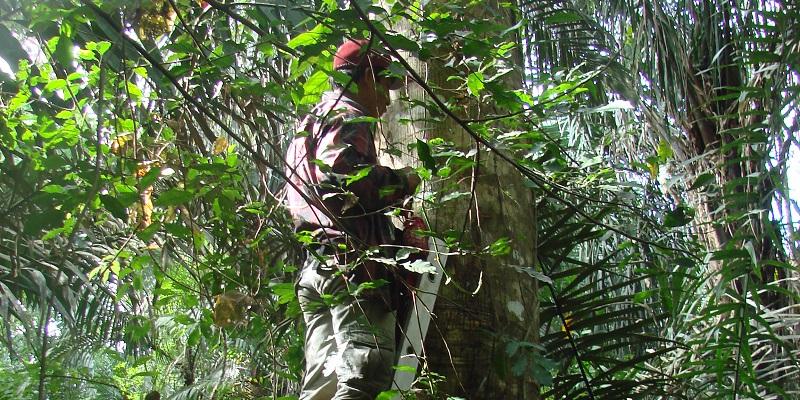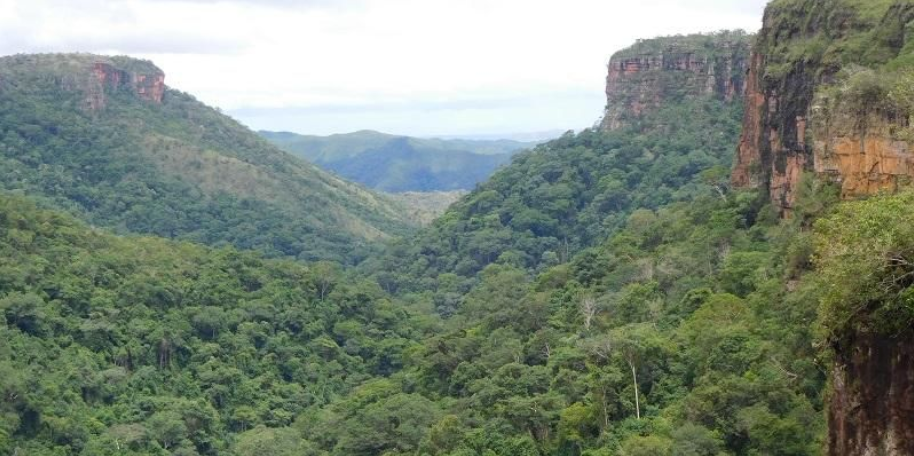Tropical forests in South America lose their ability to absorb carbon from the atmosphere when conditions become exceptionally hot and dry, according to new research.
For a long time, tropical forests have acted as a carbon sink, taking more carbon out of the air than they release into it, a process that has moderated the impact of climate change.
But research led by Dr Amy Bennett, a Research Fellow at the University of Leeds, found that in 2015 – 2016, when an El Niño climate event resulted in drought and the hottest temperatures ever recorded, South American forests were unable to function as a carbon sink.
El Niño occurs when sea-surface temperatures in the Pacific Ocean increase sharply, triggering a major shift in the world’s climate system. In 2015-2016, the result was exceptionally hot weather for South America. A similar event is underway now.
Dr Bennett, from the School of Geography at Leeds, said: “Tropical forests in the Amazon have played a key role in slowing the build-up of carbon dioxide in the atmosphere.
“Scientists have known that the trees in the Amazon are sensitive to changes in temperature and water availability, but we do not know how individual forests could be changed by future climate change.
“Investigating what happened in the Amazon during this huge El Niño event gave us a window into the future by showing how unprecedented hot and dry weather impacts forests.”
The researchers today report their findings in the journal Nature Climate Change. The study united the RAINFOR and PPBio research networks, with dozens of short-term grants enabling more than 100 scientists to measure forests for decades across 123 experimental plots.
The plots span Amazon and Atlantic forests as well as drier forests in tropical South America.
These direct, tree-by-tree records showed that most forests had acted as a carbon sink for most of the last 30 years, with tree growth exceeding mortality. When the 2015–2016 El Niño hit, the sink shut down. This was because tree death increased with the heat and drought.
Professor Beatriz Marimon, of Brazil’s Mato Grosso State University, added “Here in the southeastern Amazon on the edge of the rainforest, the trees may have now switched from storing carbon to emitting it. While tree growth rates resisted the higher temperatures, tree mortality jumped when this climate extreme hit.”
Operating at the limits of tolerable conditions
Of the 123 plots studied, 119 of them experienced an average monthly temperature increase of 0.5 degrees Celsius. 99 of the plots also suffered water deficits. Where it was hotter, it was also drier.
Prior to El Niño, the researchers calculated that the plots were storing and sequestering around one third of a tonne of carbon per hectare per year. This declined to zero with the hotter and drier El Niño conditions.
The change was due to biomass being lost through the death of trees.
Writing in the paper, the researchers noted that the greatest relative impact of the El Niño event were in forests where the long-term climate was already relatively dry.
The expectation was that wetter forests would be most vulnerable to the extreme drier weather, as they would be least adapted to such conditions. However, the opposite was the case. Instead, those forests more used to a drier climate at the dry periphery of the tropical forest biome turned out to be most vulnerable to drought.
This suggested some trees were already operating at the limits of tolerable conditions.

A member of the fieldwork team taking measurements from one of the trees. Picture: Emilio Vilanova
For Professor Oliver Phillips, an ecologist at the University of Leeds who supervised the research and leads the global ForestPlots initiative, the findings offered hope about the resilience of the South American tropical nature.
He added: “The full 30-year perspective that our diverse team provides shows that this El Niño had no worse effect on intact forests than earlier droughts. Yet this was the hottest drought ever.
“Where tree mortality increased was in the drier areas on the Amazon periphery where forests were already fragmented. Knowing these risks, conservationists and resource managers can take steps to protect them.
“Through the complex dynamics that happen in forest environments, land clearance makes the environment drier and hotter, further stressing the remaining trees.
“So, the big challenge is to keep forests standing in the first place. If we can do that, then our on-the-ground evidence shows they can continue to help lock up carbon and slow climate change.”
Two reports are published in Nature Climate Change related to this research. The scientific paper, “Sensitivity of South American tropical forests to an extreme climate anomaly”, and a research brief titled “Impact of the 2015-2016 El Nino on South American tropical forests”.
Further information
For more details, please contact David Lewis in the press office at the University of Leeds by email: d.lewis@leeds.ac.uk
Top image shows the valley forest at Chapada de Guimaraes, Brasil. It is the kind of peripheral Amazon forest that is especially vulnerable to drought. Picture: Rainfor


